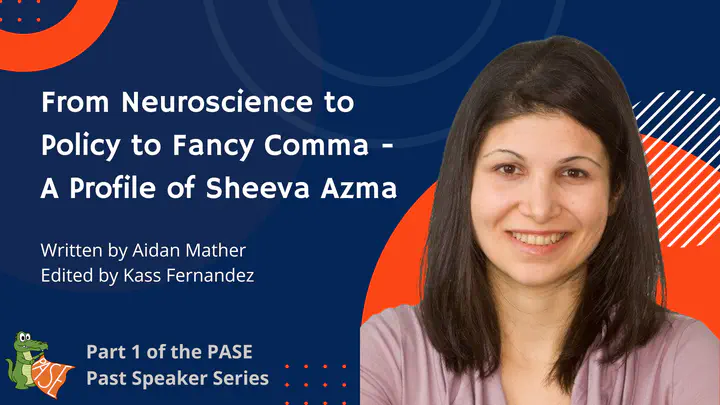From Neuroscience to Policy to Fancy Comma - A Profile of Sheeva Azma
 Graphic created by Kass Fernandez. Headshot used with permission.
Graphic created by Kass Fernandez. Headshot used with permission.When Sheeva Azma entered graduate school to pursue a PhD in neuroscience, she didn’t imagine her career would take her through science writing, public policy, and eventually founding her own communications firm, but like many careers shaped by unexpected circumstances and opportunities, her journey became about more than the lab. It became about connecting science to the people who need to understand it most.
Today, Sheeva is the founder of Fancy Comma, LLC, a science communications and policy consulting firm based in Washington, D.C. Through Fancy Comma, she translates complex scientific topics into accessible writing for the public, policymakers, and organizations navigating the intersection of research and communication. Her path to this role, however, was anything but straightforward.
“In 2013, I left my PhD program with a Master’s — my project ran out of funding — and that was when I figured out a plan B for my life without knowing it,” she explained. “At the time, I was the only person in my program admitted my year who had not gotten her PhD, but in today’s time, when grants and fellowships are being cancelled left and right, my experiences are all-too-common. I immediately signed up for a freelancing website called Elance — now Upwork — and that’s how it all started.”
Freelance science writing soon turned into broader opportunities. Sheeva interned in the U.S. House of Representatives, gaining firsthand experience in science policy. Though that internship left her saddled with debt, it also deepened her commitment to bridging science and politics.
“After I came back from that experience with $13K in debt, I started freelancing more seriously to pay my debt. In the pandemic, I got into science journalism as well,” she recalled.
Today, she sees science policy and science communication as inseparable.
“A lot of my work involves thinking about scientific things and how to explain them to nonscientists — and how to do that to get things done,” she said. “Science policy and communication are inseparable as the importance of science must be repeatedly communicated to important people such as policymakers, who are largely nonscientists. Unless more scientists are elected to public office, this need will persist.”
From Research to Politics
Sheeva’s interest in politics predates her professional career.
“I’ve always been interested in public policy — even before I could vote, I was working on political campaigns,” she said. “I wrote a whole series of essays called A Scientist in Politics which details my dual journey through science and policy.”
Her political writing, combined with her communications work, laid the foundation for Fancy Comma.
Building Fancy Comma
Starting Fancy Comma gave Sheeva the opportunity to create something new in the science communications world, a company that doesn’t shy away from difficult or “political” topics.
“The most rewarding aspect of building and leading Fancy Comma was building, from scratch, a small thought engine dedicated to the pressing issues of our time that never get funded or talked about,” she explained. “It is never “too political” to stand up for your values and for what is right.”
Of course, navigating the intersection of science, marketing, and policy isn’t easy. “It’s tough! Indeed, these three things factor into all of our projects,” she said. “There’s a lot more planning involved in this type of work than there is actual writing. As a result, I tend to read a lot — about science, the news, what is going on in the world, even public attitudes toward science and policies.”
Communicating in a Pandemic
One of the most challenging yet meaningful projects she’s taken on involved communicating about mRNA vaccine science during the COVID-19 pandemic.
“We really need to dig into people’s questions as science communicators and tackle them, no matter how obvious the answers seem to us as people well-versed in science,” she said. “I remember in the pandemic we were communicating mRNA science at a time when mRNA was new to people. My office was just a couple of miles away from some notorious anti-vaxxers so I worked in fear and sometimes did not go to my office.”
Her reflections underscore the very real stakes of science communication, not only explaining science but doing so in an environment of distrust and even hostility.
Lessons and Advice
Looking back, Sheeva doesn’t point to a long list of regrets. Instead, she emphasizes the value of building resources for others.
“Fancy Comma is not just another science communications company — we are building something new that has never existed before in the science policy and science communications world by providing free resources for scientists to upskill,” she said.
For students considering careers in science writing or communications, her advice is straightforward:
“Stay curious, learn new skills, explore different ways of thinking about the world, don’t compromise on your values, and find ways to meet the moment.”
Closing Thoughts
Sheeva Azma’s career shows that a path cut short in one direction can open possibilities in others. From neuroscience research to the halls of Congress, and now through her work at Fancy Comma, she demonstrates how science communication is more than a side effort; it’s essential infrastructure for connecting knowledge to action.
Editor’s Note: You can keep up with Sheeva by following Fancy Comma’s account on BlueSky!